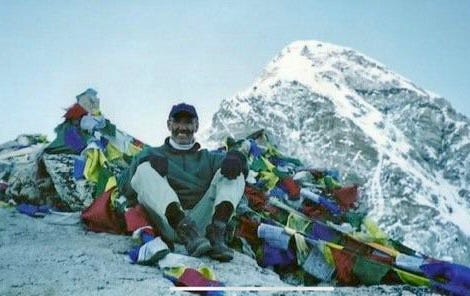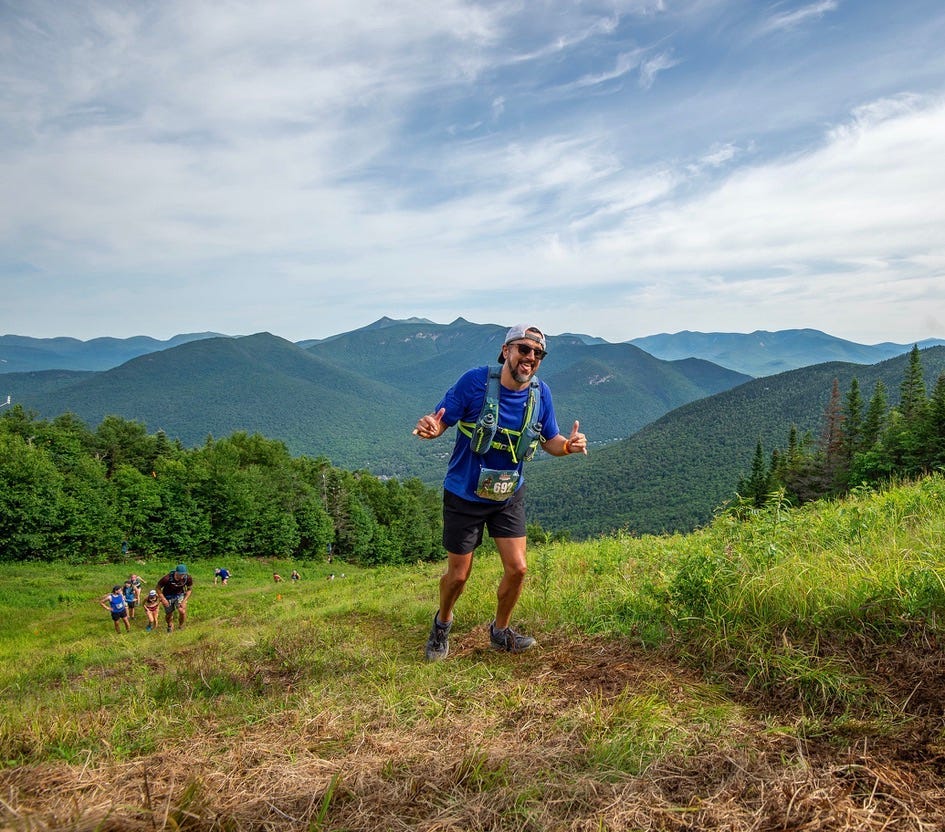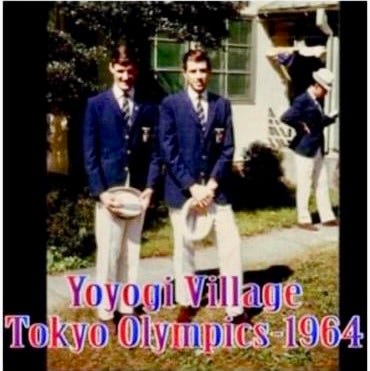Bill McKim: The Olympic runner who needed a push to go to the Games
We spoke to William McKim’s granddaughter Georgia Francis about how the middle-distance runner, marathoner and mountaineer almost didn’t make the 1964 Japan Games

The year was 1964 and William McKim, a middle distance runner from Kettering, was about to break the sub-four minute barrier for a mile.
In doing so - winning the City Charity Mile at London’s Motspur Park in the progress, Bill would become only the tenth British and the 50th runner worldwide to break four minutes for the distance since the great Sir Roger Bannister first achieved that feat just 10 years earlier.
You might be forgiven for thinking the 22-year-old Kettering Harrier had been nailed on to compete for Great Britain in the 1964 Olympics in Tokyo.
The truth was more complicated, but at least proves one old adage true: behind every great man, is a great woman.
An unusual selection process
Because without the help of his wife, Brenda, the 1,500m runner quite possibly wouldn’t have gone at all.
Sadly, Bill died in June this year, aged 81, so it was left to his granddaughter Georgia Francis to tell Running Tales the story.
“He wasn’t originally selected for the Olympics,” she said. “They took three athletes for each event and two were selected straight away, even though they hadn’t done the qualifying time in competition and my granddad had.
“It got closer and closer to the Olympics and they still hadn’t picked the third athlete, so my nan wrote a letter to the head of the committee asking if it was because my granddad came from a lower class as he was faster than all of the other athletes.
“She sent this really strong letter, and my granddad was invited to a buffet dinner with the committee and came home at two o’clock in the morning.
“My nan asked ‘what are you doing? Where have you’ve been?’. And my granddad said, ‘just to let you know I’m going to Tokyo’.”
Also on Running Tales:
How Jeremy Singh went from overweight dad to ultra runner - and 40,000 Twitter followers
Start with “stupid” and end in success… What does it take to complete a 145-mile race?
From marathons to best selling books - how running changed Hannah Phillips' life
Incredibly, after persuading the committee to select him, Bill told Brenda he didn’t actually want to go.
The couple had just had a baby - Georgia's mum - and the family were short of money.
In an interview with BBC Radio Northampton in 2021, on the eve of the Olympics returning to Tokyo, Bill even said his selection had been “a bit of surprise”.
He said: “As far as I was concerned I was good enough to be in the Olympic Games.
“But in the end, I didn’t want to go. As long as I had proved I was good enough that’s all I needed.”
Japan and jabs - ‘I could have won’
Georgia said after all the effort to get him selected, Bill was always going to go in the end but sadly the delay confirming his place was to cost him in the long run.
It meant he had little time to get all the inoculations he needed to make the journey to Japan. As a result, Georgia said one of the jabs which was supposed to be given twice within a six week period was administered twice in six days.
By the time he was due to compete in Tokyo, Bill was feeling really ill.
“On the morning before the race he didn’t sleep at all,” Georgia said.
“He was so poorly, and I think nowadays he wouldn’t have been able to race with the state he was in.”
In the end, Bill finished fifth in his heat, an agonising 0.4 seconds short of qualification for the semi-finals.
It was the same time - 3.46.8 - that was recorded by New Zealand’s Peter Snell, who finished fourth in his slower heat. Snell qualified and went on to win Olympic gold.
Georgia said: “Three or four months after the Olympics he actually beat Peter Snell.
“I used to say to him ‘imagine if you weren’t poorly, do you think you would have won?’ and he’d say ‘definitely, I could have done better but I was just happy to be selected’.”
Although his reaction to the inoculations meant he underperformed, Bill loved the experience of being at the Olympics.
Running had sent a humble man from Kettering half-way around the world to compete for his country at the very highest level.
From running laps to racing to work
Georgia said her granddad had always wanted to run, achieving incredible things even as a child.
As one of six children and with his family having little money, young Bill had found a “sense of freedom” in running.
“I remember him telling me a story from when he was seven or eight,” Georgia told the Running Tales Podcast.
“Where his family lived in Corby, there was a bit of land in the shape of an athletic track outside the house, and my granddad wanted to do 100 laps of it.
“He got to lap 97 and his mum called him in for dinner - he came in, never did the 100 laps and apparently he was fuming inside.”
Despite that early foray into the world of running, Bill hadn’t taken it seriously until after school - and even then it was only because his work situation forced him to.
As a young TV engineer, he had to run the 10 miles between his Kettering home and work in Corby, there and back for six working days every week.
At that point, he couldn’t afford a bus fare so running was the only way to get there.
Georgia said: “Some days he would even run back at lunch times to feed my mum, and then run back again to finish the day.
“Even when it came to the Olympics, that was his training. The only other thing he did was run round the cricket pitch in Kettering.”
After his first sub-four minute mile in 1964, Bill repeated the feat a year later when he once again won the City Charity Mile.
Still a young man he had been in contention for the Olympics in 1968, staged in Mexico, but a troublesome ankle injury not only ruled him out but brought an end to his track career.
Eventually - with a move to Thetford, where he founded Thetford Athletics Club, and back to Northamptonshire in between - he turned his attention to marathon running.
His first event was the 1979 New York Marathon where he finished as the third Briton and in 73rd place overall in a time of 2.28.24. Bill Rodgers’ winning time was two hours 11 minutes.
Medals and modesty

Despite all his achievements, Bill very rarely spoke about his running success in later years.
Georgia said: “It was like getting blood out of a stone.
“It was more my nan telling these stories and he would fill in the gaps.
“He had his medals in the cupboard under the stairs, but they were right at the back. You’d have to get everything out before you got to the medals. He just didn’t talk about them at all.
“In the house there were cabinets full of glass crystals he had won at race meetings and he had all his Olympic stuff he had been given, but you wouldn’t know what it was as he wouldn’t talk about it.
“There was a photo of my granddad crossing the line in one of his races which my nan had to force him to put up on the wall. He didn’t want it up there as he didn’t want people to ask him about it.”
In later life, Bill swapped running for extreme hiking. He climbed Everest twice, getting to the highest point you could get to without oxygen, and did a hike across Navada’s Grand Canyon -completing a two-day trek in a day as he didn’t see the point in taking so long over it.
Peru’s Inca Trail was another highlight as he completed the four-day walk to Machu Picchu.
It was a challenge Georgia took on herself last year, following in the footsteps of her much-travelled granddad.
At Machu Picchu’s famous Sun Gate she took a picture standing at the same spot he had years before, while a clearing in the clouds allowed her to FaceTime Bill and Brenda - “there were a lot of tears”.
Becoming Bill the Magpie
Georgia said: “I spent a lot of my childhood with my nan and granddad. I used to go every Friday and Saturday, and my granddad would take me out for cycle rides, walks and hikes.
“He was really laid back. We used to call him the magpie because on walks he would pick up anything on the floor and it would all stay in little pots. Years later he would need something and go, ‘ah, I’ve got that pin’. And he go into a pot, grab the pin and use it to hang up a photo.
“Because he hadn’t had much when he was younger, whatever he did have he made the most of.
“We bought him so many pairs of new trainers, but he just wanted to wear his old ones. There was one old pair of shoes that you could pick up and rattle because the soles had worn away so much that rocks had collected inside. He used to shake them and find it hilarious he was still able to wear them after 12 years.”
From Everest to the Olympics, Bill McKim travelled the world but at heart the sub-four minute man always remained a humble Kettering boy who ran laps outside his house for fun and loved his family.
Thanks as ever for reading and listening to Running Tales. We couldn’t do this without your support - please back us to keep going by…




